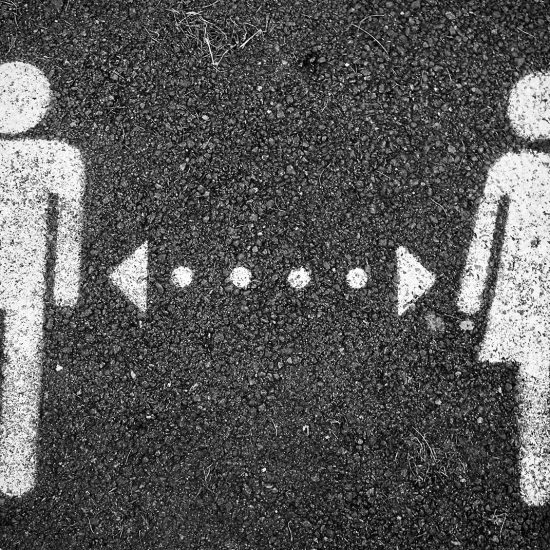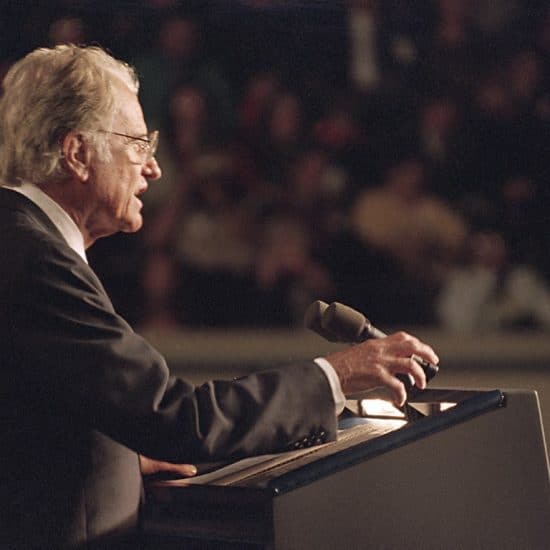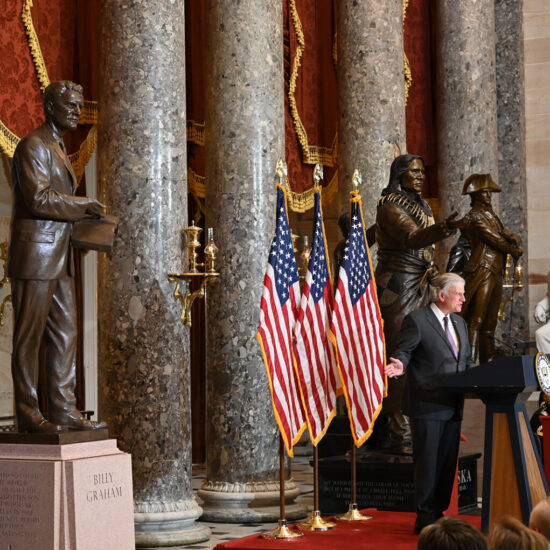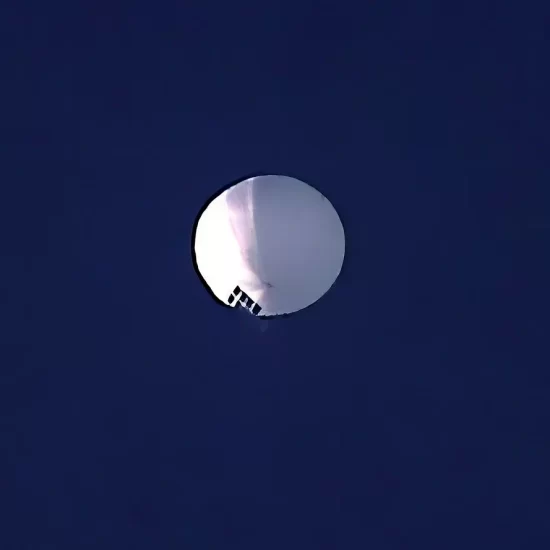One hundred years ago this month, on November 7, 1918, William Franklin Graham Jr. was born in a farmhouse near Charlotte, N.C. Although he was on Gallup’s list of the most admired people in the world a record 61 times, he was known around the world as simply Billy Graham. My wife June and I had the privilege of attending the Eleventh Congress of the Baptist World Alliance in June 1965. That Congress was held in Miami Beach, Fla., and the Saturday evening and Sunday afternoon sessions were held in the Miami Orange Bowl stadium. Graham preached at both of those large meetings — and we, along with thousands of others, were able to shake hands with him after the close of the final service.
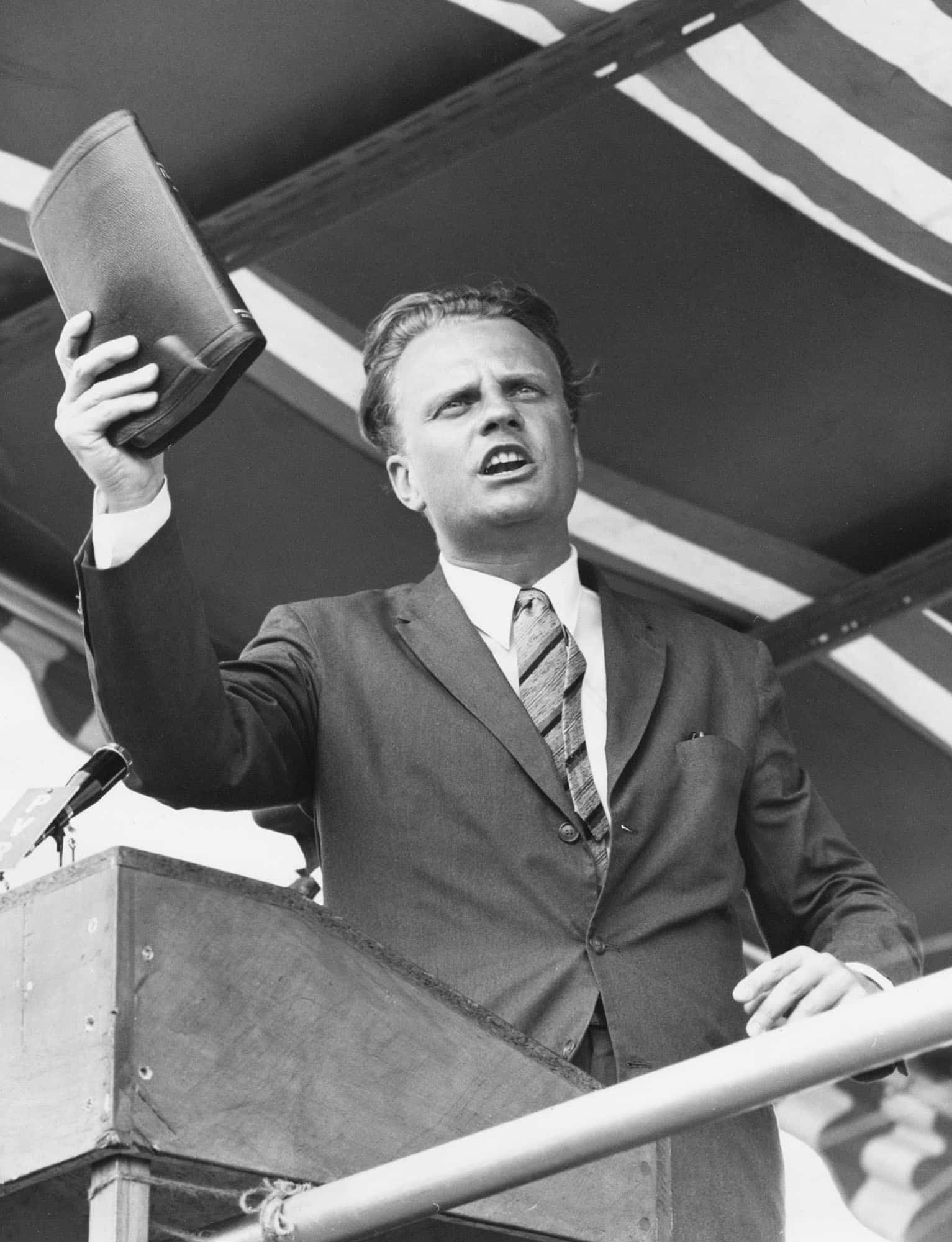 For six decades, Billy Graham proclaimed the Gospel in a simple and courageous way at stadium events in more than 180 countries outside the United States. One of these was in Bulwayo, Zimbabwe in 1960. Photo by IMBThe next year we were appointed Southern Baptist missionaries to Japan and moved to Tokyo. While we were in language school, the 192nd Billy Graham Crusade was held there in October 1967. An average of more than 15,000 attended the nightly meetings, which were held in the Budokan, the sports arena built for the 1964 Olympics. Then on Sunday afternoon more than 40,000 people gathered in Korakuen, the most prominent baseball stadium in Japan, for the final evangelistic service.
For six decades, Billy Graham proclaimed the Gospel in a simple and courageous way at stadium events in more than 180 countries outside the United States. One of these was in Bulwayo, Zimbabwe in 1960. Photo by IMBThe next year we were appointed Southern Baptist missionaries to Japan and moved to Tokyo. While we were in language school, the 192nd Billy Graham Crusade was held there in October 1967. An average of more than 15,000 attended the nightly meetings, which were held in the Budokan, the sports arena built for the 1964 Olympics. Then on Sunday afternoon more than 40,000 people gathered in Korakuen, the most prominent baseball stadium in Japan, for the final evangelistic service.
Soon after we moved to Tokyo, June became friends with Mrs. Ito, a woman who lived in our neighborhood. The following year, Mrs. Ito sometimes went with us to Tokyo Baptist Church — and then she accepted our invitation to accompany us to the Billy Graham Crusade in the Budokan. At the close of the second service she attended, she made a profession of faith.
That was a great joy for her — and for us. As far as we know, she was the first Japanese person we had witnessed to who became a Christian, and that was largely because of the preaching of Billy Graham.
Thirteen years later, in the autumn of 1980, Graham came back to Japan. This time he held a crusade in Fukuoka City as well as in Tokyo, Osaka and Okinawa. Fukuoka is the city where Seinan Gakuin, the school system founded in 1916 by Southern Baptist missionaries, is located. In the fall of 1968 I had the privilege of joining the university faculty there.
A few weeks before those 1980 crusades, I dropped by the Seinan Gakuin Chancellor’s office to talk with my sempai (older colleague) Luther Copeland. During our conversation, Chancellor Copeland mentioned that he had just received a letter from the Billy Graham Evangelistic Association. Billy wanted to know what Christian terms were difficult for the Japanese to understand. I was impressed at the world-famous evangelist’s desire to learn about Japanese ways of thinking in order to be able to preach the Gospel more effectively in Japan.
During our conversation, Luther asked me how I would respond to Graham’s request. With little hesitation I said, “To begin with, the terms God, sin and salvation” — and I would say the same today. During his brief time in Fukuoka, Graham preached at Heiwadai, the professional baseball stadium, and thousands and thousands of people, most of whom were not Christians, even sat under umbrellas in the rain to hear his evangelistic messages. He also accepted the invitation to preach in the chapel service at the small Baptist seminary that is a part of Seinan Gakuin University but was then on a separate campus.
That morning I had responsibilities on the main campus, a couple of miles away, but I rushed out to the seminary campus as soon as I could, arriving a few minutes after the chapel service had ended. To my surprise, Graham was sitting on a chair on the platform, asking students questions and listening to their answers! That had been at his request — and I was greatly impressed with his humility and his willingness to learn from our seminarians.
Since the seminary facilities were rather small, the traditional Japanese practice of taking off one’s shoes and wearing slippers inside the buildings was followed. Graham’s feet did not fit into the Japanese-sized slippers, so Calvin Parker, my missionary colleague, gave his larger slippers for Billy to wear that morning. Later, when Graham took off the borrowed slippers to leave, Calvin said jokingly, “We should put these slippers in a display case with a card that says, ‘Billy Graham wore these slippers’!”
There wasn’t universal support for Graham among Christians in Japan. From the beginning, many objected to the use of the word “crusade” for his evangelistic meetings. Japanese high school students learn about the Crusades that began in 1095 — and many have negative feelings toward Christianity because of that.
Then in the early 1970s there was criticism of Graham’s close association with President Nixon and, in that connection, with the Vietnam War. But by 1980, Graham’s position on the latter had shifted significantly, and he was warmly welcomed by our seminary faculty and student body.
During his long lifetime, Graham preached in person to more people than anyone in the history of Christianity. And to the end of his long and fruitful life, there was never a hint of sexual or financial immorality about him — unlike many prominent Christian leaders during his lifetime and since.
When he passed away in February, perhaps more than anyone else who has died this year, or even in this century, Billy Graham surely deserved to hear the words, “Well done, good and faithful servant.”
Leroy Seat served as a Southern Baptist missionary in Japan beginning in 1966. Upon his retirement in 2004, he became professor emeritus at Seinan Gakuin University and pastor emeritus of Fukuoka International Church. He and his wife, June, now live in Liberty, Mo.

